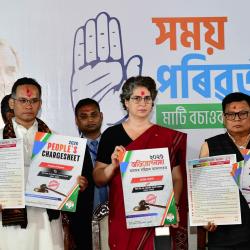“I love to see a young girl go out and grab the world by the lapels. Life’s a bitch. You’ve got to go out and kick ass”- Maya Angelou.
Although far distant from reality, Angelou, a black feminist civil rights author/poet was definitely visualizing a safer world where humans, irrespective of sex/gender enjoy the same liberties and possibilities to explore. Unfortunately, Angelou’s powerful words for women’s freedom and equal opportunities have not really been a lived reality for most women and life’s indeed been a real bitch!
“I am a freelance journalist and I donot have fixed 9-5 work schedules. On most occasions I travel alone and the city doesnot feel safe after nightfall,” expresses 29 yr old Mandira who is based in Guwahati city. While at one end of the debate, globalization has rendered women entry into the labour market and there is visibility of women in the public domain, experiences like that of Mandira’s galore. The city as a public space has undergone transformation and the manner in which this space is negotiated by women in their everyday is an interesting area worth revisit. Just when the question of women’s safety is reiterated from several dimensions, I am however compelled to be cynical of interventions that are flagged of in the name of smart city development and more importantly ‘women’s safety’.
Guwahati as an urban space has undergone a shift in its physical landscape, especially in the last 4-5 years. With the coming up of shopping malls, coffee shops, lounges, clubs and bars, the city has opened up a myriad of options for the urban middle and upper middle class. While these options cater mostly to a particular class of the population, these are also spaces that are predominantly masculinised. Negotiating safety and escaping victimization is the highest priority and concern while women access these spaces in the city.
In September 2015, Assam State Transport Corporation (ASTC) initiated bus services in Guwahati city that ply till midnight. While many applauded this new initiative of the state transport corporation, one failed to notice the flip-side of such measures. On any random day, if one attempts to observe the number of commuters in these buses, perhaps she/zhe/he may not be appalled to notice that the only commuters in these buses at night are always men. This could easily be passed off as a common or preety ‘normal’ sight given the fact that it is always men who have more accessibility to public spaces in comparison to women. Many like Mandira who are independent working women struggle everyday in negotiating spaces for safety in public. From the voyeuristic ogle, to the lewd remark, the sickening stroke of the pervert while commuting in public transport to the most brutal of molestation and rape cases, safety is becoming an everyday challenge for urban women in Guwahati city, mostly for those who have to travel at night.
My horrendous experiences twice in the last two months prompted me to break the disturbing silence and vehemently emphasise the fact that in the name of women’s safety it is always moral policing that is reinforced. On both occasions I was coming home after wrapping up some work assignment and it was roughly 9:45/10:00 PM. In the first instance being stalked by three cars, then being stopped at one point and being asked to get into one of the cars, it is almost impossible for me to now describe how narrow an escape it was. Barely a month later after this, on a similar night, I was desperately trying to get a public transport to commute back home. While waiting near a bus stand I could luridly see the desperate ogle and prowling men eyeing just like a vulture waits desperately to pounce on a fresh piece of meat. I know of many women who share similar stories, many who donot even have platforms to share. I am aware that this experience is neither one of its kind nor one that will shake an entire community of feminists or policy makers to debate for change. My emphasis here is on similar narratives that are part of lived realities of women’s everydayness in negotiating spaces for safety. Most narratives express feelings of fear and a concern to protect oneself in the face of vulnerability that women have to succumb to. The manner in which the feminine body is sexualized increases these vulnerabilities and contributes to the body becoming a site of continuous abuse and violence. This limits her possibilities and accessibility restraining her from participation in social and public life and to draw boundaries and to succumb to exclusion.
Many Indian cities like Kolkata, Delhi and others have held ‘Reclaim the Night’ and ‘Take Back the Night’, where exclusively female bodied persons and those identifying as women participate in reclaiming the streets of the city at night. Guwahati is yet to see such campaigns make headway, but the more important question is how far do these campaigns ensure real safety of women? While in a campaign, walking down the streets and dark alleys in groups may seem to be a doable proposition, how many of us would really feel secure when we have to access these streets and alleys on any mundane night while on our own? In the last one year, many private cab services like Ola and Uber have also started their services in the city. These services and facilities are exclusively classist and cater to only a selected population. There is yet another section that goes completely excluded who donot have the means to avail these services. For this section of women, public transport is the only option. At the same time, safety in cabs itself despite GPS and route tracking options is a challenging question.
How inclusive are then the steps and interventions that make headlines in the name of accessibility and safety? How inclusive is it for a disabled working woman who has to commute at night? How inclusive is it for a working woman who has to commute from ISBT after reaching the city in the wee hours? How inclusive is it for the women in the call centre (it is only very recently that BPO’s like Anjaybee and Serco have started night shifts in the city) who donot necessarily avail the cab service? How inclusive is it for the nurse and the waitress who has to reach home after completing their night shift? How safe is it for a woman and the trans-woman who needs to use a public restroom? Oh wait, this is not a problem for us..because firstly, hardly are there public restrooms in Guwahati and second, unisex toilets for queer and trans persons will perhaps take several light years to accomplish in Guwahati. How inclusive is it for the young woman who has to be back to her hostel/flat/home after a couple of leisurely drinks? Ah, pause….A young woman indulging in leisurely drinks? Isn’t that the root cause of the problem? Yes, that is what is predominantly reinforced in every bit of our masculinist cultures (to hell with those glorifying northeast as a haven of egalitarian culture!). Victimization and policing begins from dictating the ‘proper code of conduct’ to guidelines and prescriptions for ‘the right dress’, ‘the right time’ and ‘the right place’ all clubbed together in order to ensure the safety of the ideal and singular model of the ‘Axomia naari’.
Disciplinary and moralistic dictates on women’s everyday impacts at multiple levels restricting and limiting their options. Dominant patriarchy and similar socialization produces spaces of unequal power relations where women are compelled to succumb. While an increasing participation of women in public spaces in the city is visibly noticed, this is not to indicate that women as subjects are now empowered or liberated. It is time that interventions and measure taken to ensure safety are more inclusive and from a bottom-up approach rather than something that is top-down without considering the needs and specificities of women and their subjectivities.
- Add new comment
- 42001 reads










Comments
Very thoughtful ,well writen
Yes, it is the plight of
Add new comment